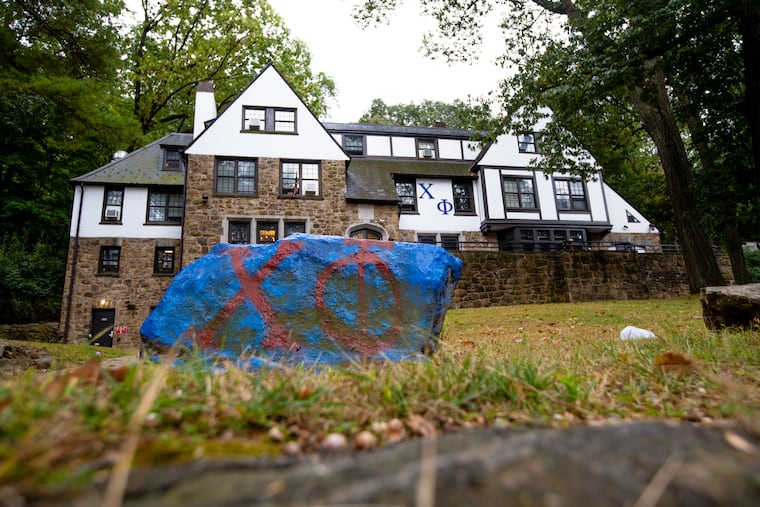Lehigh University pauses most Greek life activities amid concerns over hazing, drinking
"We have received reports from parents, new members and anonymous sources centered around excessive alcohol consumption, drug use, and hazing," Lehigh president John D. Simon and Ricardo Hall, vice president for student affairs said in an email to the university community Tuesday.

Lehigh University on Tuesday halted most Greek life activities on campus amid renewed concerns about excessive drinking, hazing, and drug use.
In an email to the university community, president John D. Simon and Ricardo Hall, vice president for student affairs, announced a suspension of all new member activities. They also prohibited contact between existing members and new members, and any events that are not business-related. That means no parties or purely social events.
They also ordered that all houses remain alcohol-free, including individual rooms in the houses. A hard-alcohol ban had been in place, but Lehigh now will prohibit beer and wine, too.
The “pause” on Greek social life, as Lehigh calls it, comes amid intensifying concern about behavior, despite a 10-point plan for improvement instituted by the university last year and commitment from Greek life leaders to work toward change. It also comes as membership has been falling in fraternities and sororities at the Bethlehem campus, long known for its vibrant Greek life and large fraternity houses on a hill.
» READ MORE: Greek life is at a crossroads on some campuses
“We have received reports from parents, new members and anonymous sources centered around excessive alcohol consumption, drug use, and hazing,” Simon and Hall wrote in the email. “Several chapters have been disciplined, others have been warned, and all have been told in unequivocal terms that this behavior is unacceptable and antithetical to all that we aspire to as a university.”
The email did not offer specifics about the behaviors or name the groups affected. Lehigh posts behavior infractions on its website. In the last week, five organizations have faced allegations, according to the site. The university placed the Delta Chi fraternity on temporary suspension Monday, pending the outcome of an investigation into an incident in which police found 200 students, all wearing similar clothes, leaving the house. The floor was soaked with beer and strewed with garbage, according to the report, and a student alleged that the chapter offered cocaine to a new member.
Also suspended last week was Theta Xi fraternity after an investigation into members who returned to campus intoxicated after a recruitment event and got into a fight.
Other allegations included alcohol-related infractions at Delta Upsilon fraternity and hazing, and “intentionally furnishing false information” to university officials at Alpha Phi and Gamma Phi Beta, both sororities.
» READ MORE: Colleges grapple with the deadly combination of drinking and hazing
Sororities at Lehigh already have welcomed new members this semester, but fraternities were just about to send out bids for new members, said university spokesperson Lori Friedman. That process has been stopped, she said. The university said the pause would not be lifted until Greek life leaders come up with a “detailed and realistic” plan for improvement.
Vincent Albanese, president of Lehigh’s Interfraternity Council, issued a statement on Wednesday.
“The Interfraternity Council agrees that the health and safety of students must be a top priority," said Albanese, a senior from Oradell, N.J. "We are committed to working with the university and all parties to create a plan to improve our community. Wrongdoers should be held accountable but we must respect the rights of those who are living up to the standards of fraternal excellence.”
The North American Interfraternity Conference also weighed in Wednesday, asserting that blanket action regarding the Greek system is not the right step.
“Among other concerns, they disincentivize following the rules and taking care of each other, since responsible students are treated just like their peers causing problems,” said Todd Shelton, chief communication officer. “Blanket actions also erode trust between campus partners and students, alumni and inter/national organizations, because these actions come off as unilateral, lacking basic principles of due process.”
Although the university has stopped certain activities in the past, Tuesday’s action marks the first time such a widespread “pause” had been instituted, Friedman said.
The pause could further erode membership in Greek life on campus. In spring 2015, fraternities claimed 983 members — roughly 37% of the male student body. By last spring, membership had fallen just shy of 660. Sorority membership fell, too, from 1,009, or 46% of the female student body, to 834.
Simon and Hall said they had “deep concern about the safety and well-being of the students” who are in Greek life or are trying to join. Despite repeated warnings, infractions have not stopped, they said.
“If anything, the offensive and unhealthy behavior has intensified, indicating a blatant disregard for the rules and a disrespect for those groups and organizations who do abide by them,” Simon and Hall wrote.